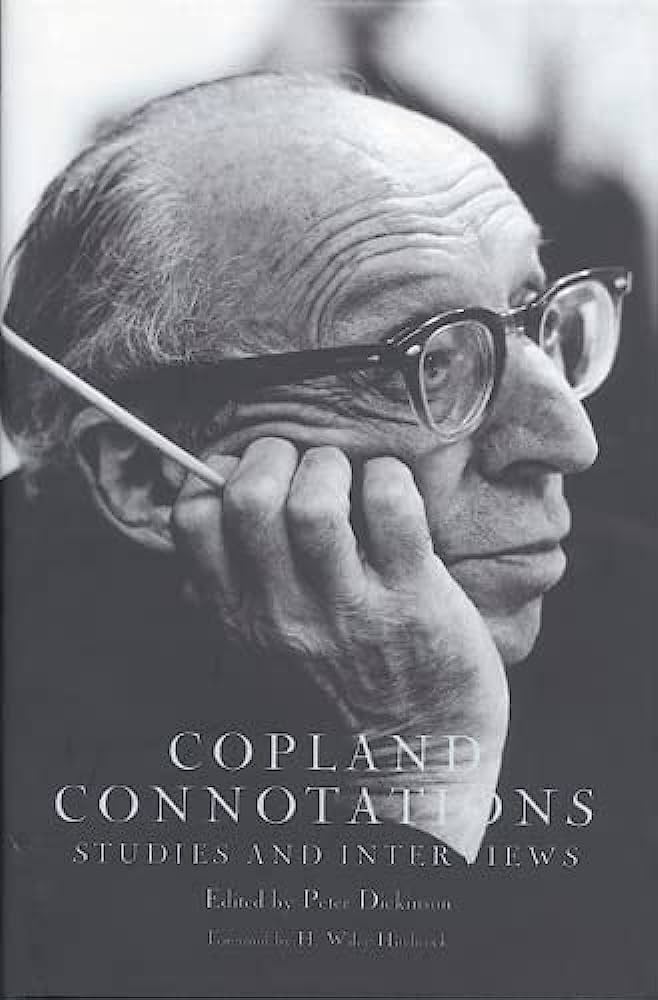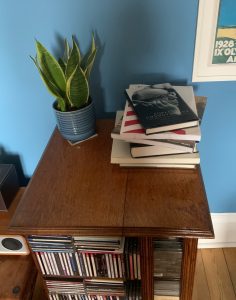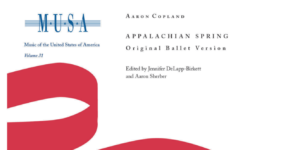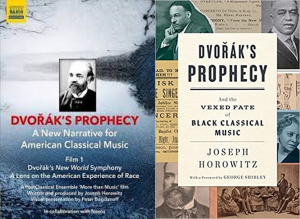
It was with sadness and a tinge of personal regret that I read about the passing of composer, writer and educator Professor Peter Dickinson last month. Peter was a real champion of American music in the UK and edited the book Copland Connotations: Studies and Interviews that was published in 2004.
When I submitted my piece on the recent Mahler / Copland book back in 2020, Michael Richards of Boydell and Brewer kindly donated a copy of Copland Connotations to me and I agreed that I would write a review. Unfortunately, I never got round to it, until now.
This is a real shame as the book is right up there with the very best writing about Copland. Pretty much every page has something to write home about! Either, new nuggets of information that had me cross referencing with other books and online sources to find out more, or lightbulb moments giving me new ideas for blogs, and possible recordings and concerts. Then, there are bits that had me pumping a fist in agreement and others that turned a view completely on its head. It’s an absolutely brilliant volume and I wish I had communicated this to Peter whilst he was still alive.
The book comprises 14 essays by some of the most important Copland scholars. These essays were written for two conferences staged in 2000, to celebrate Copland’s centenary year. (It’s puzzling to note that these conferences were in Toronto and London, not the US). There are also two interviews with Copland from 1976 and an open forum discussion transcribed verbatim in which several of the book’s contributors discuss Copland’s life, works and legacy.
Just like Copland’s autobiographies (Copland 1900-1942 and Copland since 1943) and biography by Howard Pollack (Aaron Copland: The Life and Works of an Uncommon Man), this book provides wonderful context. Thus, it illustrates just where Copland sat amongst his peers (Ives and Gershwin), in the wider musical world (jazz, Broadway, dance and film), how his music provided a sense of American identity and is part of the sountrack of so many 20th century events.
 I have read the book twice and some articles I have gone back to several times since. Oddly, a few weeks ago, I took the book out of my bookcase and put it at the top of a pile of books to read and/or review. So, when I came across Peter’s obituary in the Guardian (via Google Alerts) I decided I could put off my review no longer.
I have read the book twice and some articles I have gone back to several times since. Oddly, a few weeks ago, I took the book out of my bookcase and put it at the top of a pile of books to read and/or review. So, when I came across Peter’s obituary in the Guardian (via Google Alerts) I decided I could put off my review no longer.
The great thing about this book is that with so many writers training a lens on different facets of Copland and his life that you get so many different angles and perspectives.
I particularly liked the article Expanding horizons: Sexuality and Re-zoning of The Tender Land by Daniel E Mathers. Many people have criticised the narrative and libretto of Copland’s second opera to be rather weak. This article reframes that completely. The main character Laurie expresses feelings of being different and feeling like an outsider. For many, her leaving the farm as she does at the end of the opera makes it ‘inconclusive, uneventful, awkward and sketchy’.
But if you pause to think that Copland and librettist Horace Everett (Erik Johns) were both homosexual then the portrayal of Laurie does begin to feel like someone wrestling with their sexuality and ultimately ‘coming out’. Back in the 1950s there was absolutely no way that Copland could write a work with a homosexual storyline but it seems obvious that this inner conflict of otherness is what it’s all about. We know that Shostakovich is well known for composing subversions in his works. Interesting then that Copland was doing the same! This subtext greatly elevates it as a work of art with a ‘richness of human content’.
Another standout article is Aaron Copland and John Kirkpatrick: ‘Dear John, can you help me out?’ by Vivian Perlis. Until I read this article, I had been unaware that Copland had written two piano, four hands versions of Symphonic Ode, the scherzo from the Organ Symphony and the Piano Concerto. The latter has been published but the others reside in the John Kirkpatrick Collection at Yale. John Kirkpatrick performed them all (on occasion with Copland) but none of them have been recorded. I do find that amazing! What an opportunity for someone! I have shared details with the Naughton sisters who have recorded other Copland works as part of their American Postcard release. Considering, it will be the 100th anniversaries of the premieres of the Organ Symphony and Piano Concerto in 2025 and 2027 respectively and Copland’s 125th anniversary in 2025, wouldn’t that be something?!
My other favourite essays were Copland and Jazz boys by David Schiff and Simple Gifts and Complex Accretions by William Brooks. I was a little disappointed by Copland and Music for dance: Questioning Fundamantal Assumptions by Marta Roberstson and Copland and the Broadway Sound by Stephen Banfield. I think this was more to do with what I was hoping for from each article. Both have such intriguing titles that I imagined they would provide me with loads of new leads to follow up.
The two transcribed interviews with Copland are really illuminating. I find it particularly touching to note the obvious signs of dementia in the way that from time to time loses thread in his answers and has to ask for parts of the questions to be repeated.
The open forum is also interesting. It tends to focus, a touch unfairly on Copland’s limitations (his recycling, his following of trends rather than being a trendsetter etc) and how his output dried up in his later years. One audience member does remark on the fact that the direction of the discussion is a bit negative for a centenary celebration, to which I agree to some extent, but then again no true fan would want a hagiography!
When asked if Copland was a great composer the panel is a bit split. The consensus is probably, yes but with a few caveats. This has a nice counterpoint with a bit in the introduction. It mentions an episode when Dickinson remarked to Copland that someone had written a book about American music. Copland is reported as saying
it had two sentences on me. I put it back on the shelf”.
Dickinson then goes on to say that Copland knew his own worth. In the final question of the second interview (which concludes the book) Peter Dickinson says “I heard an interesting argument recently that you’d influenced popular music rather than popular music influencing you” to which Copland replies
I’d like it to be true but I don’t think it’s true”.
It’s a nice way for the book to conclude.
Copland Connotations is beautifully curated and lovingly put together with each article having something to offer. Peter Dickinson comes across as a real kindred spirit and I would have loved to have met him. There is so much here to commend that I do suggest that people interested in Copland do get hold of a copy. As it’s now over 20 years old you can get copies for a bargain bucket price. You won’t be disappointed!
Book details:
- Hardcover: 230 pages
- Publisher: Boydell Press; Illustrated edition (April 8, 2004)
- Language: English
- ISBN-0-85115-902-8






Blog Comments
Daniel E Mathers
23rd January 2024 at 3:56 pm
As the author of something praised on your site, I cannot but be made happy and even flattered by your review of Copland Connotations. Thank you for being so kind in your gracious estimation of that volume and of my essay in particular (perhaps its best review yet). Please know that I greatly appreciate your generous, highly perceptive and encouraging understanding.
Tomorrow is a holiday here in the U.S., but I cannot begin this year’s round of thanksgiving without also thanking you for your site in general and especially its aim of sharing your obviously profound love of Copland’s music. I confess a complete sympathy with and admiration for what you are doing. More power to you and to your all too rare energy and commitment!
Best of luck to you in the coming new year and always. I look forward ever to keeping in touch.
Kevin Lindegaard
23rd January 2024 at 3:58 pm
Unfortunately, I don’t get that many emails through the site and although I see the Likes go up you do wonder if people are really enjoying the content. Hence, it was an absolute boon to get your email. Your chapter really did open my eyes about the Tender Land. The problem with Connotations was that I loved it so much that I might have ended up writing a book rather than a blog and I kept putting it off. I was really sad that I hadn’t communicate this to Peter Dickinson but so pleased that it found its way to you.
There is hardly a day goes by when I don’t come up with a new idea for a blog and it’s hard to fit in around my other commitments. However, I do feel like I am carrying a torch and an important one at that!
BTW – I am going to Turin next May to see The Tender Land! That’s a dream come true. I saw a semi staged production at the Barbican, Lindon in 2000 and have always hoped I’d get to see it done properly. I really don’t know what people are on about when they say “weak libretto”. I used a bit from The Promise of Living in the Order of Service for my wedding. I think it is beautiful, heartfelt and lyrical. I think some people repeat the same criticism that they have heard without giving something a proper look. I think I’m preaching to the converted here so I’ll step off my soap box now!
Daniel E Mathers
23rd January 2024 at 4:00 pm
I saw a production of The Tender Land with Erik Johns, in Washington, DC (back in ’98). The lady sitting behind us had no idea who he was. When the curtain came down on the first act, she said, with a pronounced Brooklyn accent, “Remind me never to complain about Italian opera again!” She had been sighing and heaving throughout the entire Act, waiting for something to happen. We were in hysterics. (I had been in tears for the “Promise” part—such beautiful music!)